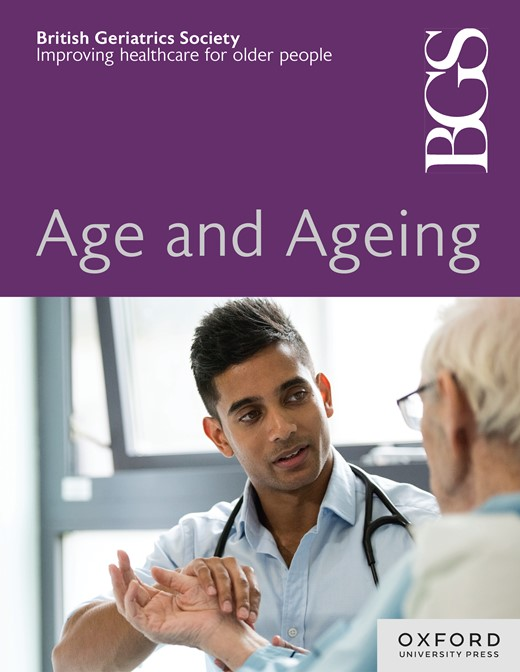3097 Nurses' views and perspectives of pain assessment and management in residents with advanced dementia in long-term care settings
IF 7.1
2区 医学
Q1 GERIATRICS & GERONTOLOGY
引用次数: 0
Abstract
Introduction There are limited evidence-based studies examining barriers and facilitators to pain assessment and management in residents with advanced dementia in long-term care settings, with no studies conducted to date in the long-term care setting in Northern Ireland. Aims: We aimed to explore care home nurses’ perspectives of facilitators of and barriers to providing optimum pain assessment and management to people with advanced dementia living in the nursing home setting in Northern Ireland. Methods One-to-one semi-structured interviews were conducted with nursing home nurses. Nurses who actively provided care to residents living with dementia, nursing home managers, regional managers, trainers who were registered nurses with the Nursing and Midwifery Council and who supported the provision of dementia care in a nursing home setting, and nursing home nurses who had completed their induction or preceptorship training were eligible to participate. Participants were recruited through the Queen’s University Belfast Care Home Research Community of Practice. An interview guide was developed and piloted with three nurses who met the eligibility criteria. Interviews were conducted using Microsoft Teams, audio-recorded, transcribed verbatim, and analysed using reflexive thematic analysis. Ethical approval was obtained from the Faculty of Medicine, Health and Life Sciences Research Ethics Committee, Queens University Belfast. Results Interviews were conducted with 10 nurses between November 2023 and June 2024. Reflexive thematic analysis generated six themes: (1) the crucial role of the nurse, (2) recognising and assessing pain, (3) pharmacological and non-pharmacological approaches, (4) communication with families and healthcare professionals, (5) training and resources, and (6) barriers and challenges in pain assessment and management. Discussion/Conclusion Nursing homes should implement standardised policies and protocols, enhance nurse education on pain assessment tools and management strategies, and promote interdisciplinary collaboration to enhance recognition and management of pain and ultimately improve the quality of life for residents with advanced dementia.3097 .护士对长期护理中晚期痴呆患者疼痛评估和管理的看法和观点
关于长期护理机构中晚期痴呆症患者疼痛评估和管理的障碍和促进因素的循证研究有限,迄今为止尚未在北爱尔兰的长期护理机构中进行过研究。目的:我们的目的是探讨护理之家护士的观点,促进和障碍提供最佳的疼痛评估和管理的人与老年痴呆症生活在养老院设置在北爱尔兰。方法对养老院护理人员进行一对一半结构化访谈。积极为痴呆症患者提供护理的护士、养老院管理人员、区域管理人员、在护理和助产委员会注册并支持在养老院提供痴呆症护理的培训师,以及完成了入职或实习培训的养老院护士都有资格参加。参与者是通过贝尔法斯特女王大学养老院研究实践社区招募的。制定了一份面试指南,并对符合资格标准的三名护士进行了试点。访谈使用Microsoft Teams进行,录音,逐字转录,并使用反身性主题分析进行分析。获得了贝尔法斯特女王大学医学、健康和生命科学研究伦理委员会的伦理批准。结果于2023年11月至2024年6月对10名护士进行了访谈。反思性专题分析产生了六个主题:(1)护士的关键作用,(2)识别和评估疼痛,(3)药物和非药物方法,(4)与家庭和医疗保健专业人员的沟通,(5)培训和资源,以及(6)疼痛评估和管理中的障碍和挑战。疗养院应实施标准化的政策和方案,加强护士对疼痛评估工具和管理策略的教育,促进跨学科合作,提高对疼痛的认识和管理,最终改善晚期痴呆患者的生活质量。
本文章由计算机程序翻译,如有差异,请以英文原文为准。
求助全文
约1分钟内获得全文
求助全文
来源期刊

Age and ageing
医学-老年医学
CiteScore
9.20
自引率
6.00%
发文量
796
审稿时长
4-8 weeks
期刊介绍:
Age and Ageing is an international journal publishing refereed original articles and commissioned reviews on geriatric medicine and gerontology. Its range includes research on ageing and clinical, epidemiological, and psychological aspects of later life.
 求助内容:
求助内容: 应助结果提醒方式:
应助结果提醒方式:


